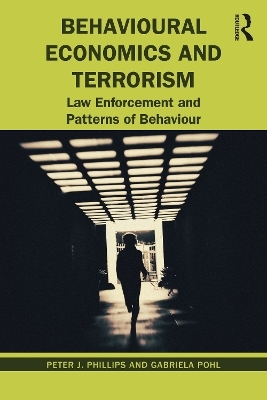
Behavioural Economics and Terrorism
Routledge (Verlag)
978-0-367-70046-1 (ISBN)
In the high-stakes world of counter-terrorism, every angle of advantage is critical. From terrorists’ operational choices to the way that information flows through intelligence agencies, the book explains the patterns of behaviour that systematically shape human decision-making, for good and for bad.
Decision-makers’ use of reference points, their loss aversion, overconfidence, goals and aspirations all shape their choices under conditions of risk and uncertainty. This book helps to shed light on how to use these concepts (and more) to develop deeper insights into the way in which terrorists think about their attack methods and targets.
Peter J. Phillips is Associate Professor (Finance) at the University of Southern Queensland, Australia. He applies decision theory, including orthodox and behavioural economics, to problem solving in counter-terrorism, intelligence, counterintelligence and law enforcement. He is particularly interested in showing how decision theory can be used to predict patterns of behaviour and in explaining how information (and disinformation) flows can be structured and organised. Gabriela Pohl is Lecturer (Social Science) at University of Southern Queensland, Australia. She uses decision theory to help people make better decisions, in law enforcement, counter-terrorism and intelligence contexts. Her work emphasises the importance of ‘thinking about thinking’ and she strives to show how decision-makers can use behavioural economics to simplify decision tasks and identify the systematic patterns of behaviour displayed by friend and foe alike.
1. Blindfold Chess and Terrorism 2. Patterns of Reason and Unreasonableness 3. Bounded by Rationality 4. Loss Aversion and Terrorist Identity 5. Prospect Theory as a Descriptive Theory of Terrorist Choice 6. The Hidden Side of Attack Method Combinations and International Terrorism 7. Cycles in Terrorism and Evolutionary Stability 8. Overconfidence, Gender Differences and Terrorist Choice 9. Expected Utility as a Measurement Tool in the Terrorism Context 10. Decision-Making with More than One Reference Point 11. A Guide to the Terrorism Studies Conversation 12. Information Cascades and the Prioritisation of Suspects 13. Everyday Decision-Making 14. Reason, Strategy and Discovery
| Erscheinungsdatum | 04.05.2021 |
|---|---|
| Zusatzinfo | 6 Tables, black and white; 26 Line drawings, black and white; 26 Illustrations, black and white |
| Verlagsort | London |
| Sprache | englisch |
| Maße | 156 x 234 mm |
| Gewicht | 660 g |
| Themenwelt | Geisteswissenschaften ► Psychologie ► Allgemeine Psychologie |
| Recht / Steuern ► EU / Internationales Recht | |
| Recht / Steuern ► Strafrecht ► Besonderes Strafrecht | |
| Recht / Steuern ► Strafrecht ► Kriminologie | |
| Wirtschaft ► Volkswirtschaftslehre ► Mikroökonomie | |
| ISBN-10 | 0-367-70046-8 / 0367700468 |
| ISBN-13 | 978-0-367-70046-1 / 9780367700461 |
| Zustand | Neuware |
| Haben Sie eine Frage zum Produkt? |
aus dem Bereich


